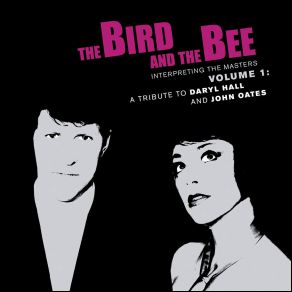Interpreting the Masters, Vol. 1 (A Tribute to Daryl Hall and John Oates)
Download links and information about Interpreting the Masters, Vol. 1 (A Tribute to Daryl Hall and John Oates) by The Bird & The Bee. This album was released in 2010 and it belongs to Electronica, Rock, Pop, Alternative genres. It contains 10 tracks with total duration of 32:51 minutes.

|
|
|---|---|
| Artist: | The Bird & The Bee |
| Release date: | 2010 |
| Genre: | Electronica, Rock, Pop, Alternative |
| Tracks: | 10 |
| Duration: | 32:51 |
| Buy it NOW at: | |
| Buy on iTunes $5.99 | |
Tracks
[Edit]| No. | Title | Length |
|---|---|---|
| 1. | Heard It On the Radio | 3:02 |
| 2. | I Can't Go for That | 3:36 |
| 3. | Rich Girl | 2:48 |
| 4. | Sara Smile | 3:06 |
| 5. | Kiss On My List | 4:18 |
| 6. | Maneater | 3:31 |
| 7. | She's Gone | 3:02 |
| 8. | Private Eyes | 3:03 |
| 9. | One On One | 3:40 |
| 10. | 4th of July | 2:45 |
Details
[Edit]The very title of Interpreting the Masters suggests that the Bird & the Bee are digging into a catalog of a widely respected pop songwriter — a Burt Bacharach, perhaps, or a Jimmy Webb. That’s not the case: children of the ‘80s that they are, singer Inara George and producer Greg Kurstin have chosen Daryl Hall & John Oates for the first volume of Interpreting the Masters, a sly move that reveals both their age and intended audience — i.e., ex alt-rockers raised on new wave and now settling into a tasteful, hipster middle age, hauling around kids dressed in Ramones t-shirts — and a reflection of Hall & Oates’ increasing reputation as soul-pop songwriters and record-makers. The Bird & the Bee don’t dig deeply into Hall & Oates catalog — there’s none of the burnished folk-rock of Whole Oates, nor do they pluck album tracks like “Looking for a Good Sign” off of Private Eyes — they simply choose the biggest hits, then give them a slyly modern update, one that consciously recalls the modernist new wave productions of the duo’s biggest hits yet fits within the Bird & the Bee’s nicely tailored AAA pop. So if Interpreting the Masters, on the surface, provides no surprises, why is it such a wonderful surprise as a whole? Perhaps it’s because the Bird & the Bee manage to make these very familiar hits sound fresh without radically reinventing them. That in itself is a much trickier move than turning these all into slow acoustic dirges, but it’s better still because these arrangements are true to both Hall & Oates and George & Kurstin. The Bird & the Bee illustrate just how much they’ve learned with their introductory original “Heard It on the Radio,” a song about the tunes they’re about to sing that holds its own with the covers, but the heart of the album lies in these covers of ‘80s staples: they shift the spotlight just enough to prove how good both the original song and singles are, and by never drawing attention to their own performance and arrangements, the Bird & the Bee prove just how good they are too.